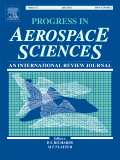
PROGRESS IN AEROSPACE SCIENCES
Scope & Guideline
Pioneering breakthroughs in aerospace sciences since 1961.
Introduction
Aims and Scopes
- Crashworthiness and Safety Design:
A significant focus on crashworthiness design and evaluation of aircraft structures, ensuring occupant survivability and safety during aviation accidents. - Advanced Materials and Manufacturing Techniques:
Research on materials such as carbon fiber composites and additive manufacturing processes, highlighting their applications in aerospace structures and components. - Aerodynamics and Fluid Dynamics:
A comprehensive examination of aerodynamics, including flow dynamics, shock wave interactions, and innovative approaches to enhance performance and efficiency in aerospace systems. - Propulsion Systems and Technologies:
In-depth studies on various propulsion systems, including hybrid-electric and advanced combustion technologies, addressing both performance and environmental impacts. - Autonomous Systems and Control:
Exploration of autonomous systems in aerospace applications, including cooperative control methods for aerial and ground systems, enhancing operational efficiency and safety. - Sustainability in Aviation:
A commitment to addressing sustainability challenges in aviation, reviewing technologies and strategies for reducing environmental impacts and achieving net-zero emissions. - Space Exploration and Satellite Technologies:
Research on emerging trends in space exploration, satellite technology, and space situational awareness, contributing to advancements in the space domain.
Trending and Emerging
- Sustainable Aviation Technologies:
There is a marked increase in research dedicated to sustainable aviation, including studies on hydrogen-powered aircraft, hybrid-electric systems, and sustainable fuel sources, reflecting a global push towards reducing aviation's carbon footprint. - Additive Manufacturing and Advanced Materials:
The exploration of additive manufacturing techniques and advanced materials continues to gain traction, with a focus on optimizing designs for performance and weight reduction in aerospace applications. - Artificial Intelligence and Machine Learning Applications:
The integration of AI and machine learning techniques in various aspects of aerospace engineering, from design optimization to predictive maintenance, is emerging as a critical area of research. - Autonomous and Cooperative Systems:
Increasing interest in autonomous systems and cooperative motion planning emphasizes the development of advanced control algorithms for both aerial and ground vehicles. - Space Domain Awareness and Cislunar Exploration:
Research focusing on space situational awareness and the exploration of cislunar space is gaining importance, driven by advancements in satellite technologies and the growing interest in lunar missions.
Declining or Waning
- Conventional Aircraft Design Approaches:
Traditional methodologies in aircraft design, particularly those that do not incorporate advanced materials or sustainable practices, appear to be less prominent as the field shifts towards innovative and environmentally friendly solutions. - Static Aerodynamics Studies:
Research focusing solely on static aerodynamic properties is declining in favor of dynamic studies that account for real-world conditions and advanced computational methods. - Basic Propulsion Concepts:
Basic studies of conventional propulsion systems are waning as researchers increasingly focus on hybrid, electric, and alternative propulsion technologies that offer improved efficiency and reduced environmental impact.
Similar Journals

Propulsion and Power Research
Elevating Standards in Aerospace and Energy Discourses.Propulsion and Power Research, published by KEAI PUBLISHING LTD, is a leading Open Access journal that has been advancing the field of propulsion and power systems since its inception in 2012. With its commitment to fostering scientific discourse and innovation, the journal has gained a prominent position within academia, achieving a Q1 ranking in multiple categories such as Aerospace Engineering, Automotive Engineering, and Fluid Flow and Transfer Processes as of 2023. With an impressive ranking of #18 out of 153 in Aerospace Engineering and consistent recognition in the Scopus rankings, the journal explores critical advancements and research findings that propel the industry forward. As an Open Access publication, it ensures that groundbreaking research is readily available to a broad audience, enhancing collaboration between researchers, practitioners, and students. The journal's scope encompasses a wide range of topics within propulsion and energy solutions, making it an essential resource for anyone keen on discovering significant developments in this dynamic field.
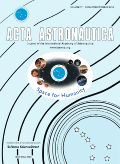
ACTA ASTRONAUTICA
Inspiring Innovation in Aerospace EngineeringACTA ASTRONAUTICA is a premier journal in the field of aerospace engineering, dedicated to advancing knowledge in space exploration and technology. Published by PERGAMON-ELSEVIER SCIENCE LTD in the United Kingdom, this journal boasts a prestigious Q1 ranking within its category as of 2023, positioning it in the top tier of aerospace engineering publications. With an ISSN of 0094-5765 and an E-ISSN of 1879-2030, ACTA ASTRONAUTICA has been a crucial resource for researchers and professionals since its inception in 1974, continuing to publish cutting-edge research through to 2024. The journal focuses on a wide range of topics, from orbital mechanics and spacecraft design to astronautics and planetary science, aiming to inspire innovation and facilitate the exchange of ideas among scholars, industry experts, and students. ACTA ASTRONAUTICA is ranked 19th out of 153 in its field, highlighting its importance and influence within the aerospace community. Researchers seeking a reputable platform to share their findings will find this journal to be an essential part of the academic discourse in aerospace engineering.

CEAS Space Journal
Pioneering insights in aerospace engineering and planetary science.CEAS Space Journal, published by SPRINGER WIEN, serves as a critical platform for advancing knowledge in the fields of aerospace engineering and space science. With an ISSN of 1868-2502 and an E-ISSN of 1868-2510, this journal has been at the forefront of scholarly communication since its inception in 2011, showcasing cutting-edge research that spans to the present day (2024). The journal holds a solid reputation, ranking in the Q2 quartile for Aerospace Engineering and Q3 for Space and Planetary Science as of 2023, illustrating its impactful contributions within these disciplines. Scopus rankings further underline its prominence, placing it in the 70th percentile among aerospace engineering journals. Although it is not an open access publication, the insights published in the CEAS Space Journal are invaluable for researchers, professionals, and students alike, providing essential studies and reviews that push the boundaries of aerospace innovation and planetary exploration. The journal's commitment to quality and rigor makes it an indispensable resource for anyone looking to deepen their understanding of contemporary challenges and technological advancements in space science.
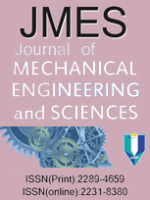
Journal of Mechanical Engineering and Sciences
Exploring New Horizons in Mechanical SciencesThe Journal of Mechanical Engineering and Sciences (ISSN: 2289-4659, E-ISSN: 2231-8380), published by UNIV MALAYSIA PAHANG, is a prominent open access journal established in 2011, dedicated to advancing the field of mechanical engineering and associated sciences. Covering a wide array of topics from industrial manufacturing processes to computational mechanics, the journal serves as a vital platform for researchers, professionals, and students to disseminate innovative findings and methodologies. With impressive Scopus rankings, including a place in the 60th percentile for Industrial and Manufacturing Engineering, the journal holds a significant position among its peers, facilitating global academic discourse. Located in Kuantan, Pahang, Malaysia, the journal emphasizes accessibility and collaboration within the engineering community, encouraging submissions that contribute to both theoretical and applied aspects of mechanical engineering.

JOURNAL OF THE ASTRONAUTICAL SCIENCES
Charting New Territories in Aerospace EngineeringJOURNAL OF THE ASTRONAUTICAL SCIENCES, published by Springer Heidelberg, serves as a leading platform dedicated to advancing the fields of aerospace engineering and planetary science. With an ISSN of 0021-9142 and an E-ISSN of 2195-0571, this journal has established a significant presence within the academic community, evidenced by its categorization in the Q2 and Q3 quartiles for 2023, positioning it among the top publications in its field. The journal encompasses a spectrum of research that spans from innovative aerospace technologies to the exploration of planetary systems, reflecting its rich scope developed since its inception in 1969. Although not Open Access, it provides vital contributions to ongoing discussions in aerospace research, appealing to researchers, professionals, and students eager to deepen their understanding of astronautics. With a notable impact factor and rankings in Scopus—66th in Aerospace Engineering and 64th in Space and Planetary Science—this journal continues to be a pivotal resource for those engaged in the exploration and utilization of space.
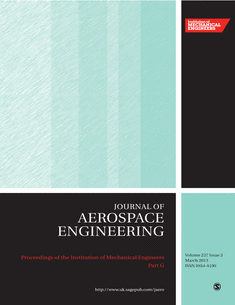
PROCEEDINGS OF THE INSTITUTION OF MECHANICAL ENGINEERS PART G-JOURNAL OF AEROSPACE ENGINEERING
Shaping the Future of Aerospace EngineeringPROCEEDINGS OF THE INSTITUTION OF MECHANICAL ENGINEERS PART G-JOURNAL OF AEROSPACE ENGINEERING, published by SAGE PUBLICATIONS LTD, stands as a pivotal resource for those immersed in the disciplines of aerospace and mechanical engineering. With an ISSN of 0954-4100 and E-ISSN of 2041-3025, this journal not only contributes to the academic community but also reflects a robust commitment to advancing knowledge within these fields. Operating from the United Kingdom, it has garnered a respectable reputation, evidenced by its category quartiles—ranking Q3 in both Aerospace Engineering and Mechanical Engineering as of 2023. Established in 1989, the journal has evolved substantially over the years, serving as a platform for groundbreaking research and innovative methodologies. Researchers, professionals, and students alike will find a wealth of insights that foster collaboration and advance the frontiers of engineering. Although currently not available as an Open Access publication, the journal remains a critical reference point for those looking to deepen their understanding and contribute to ongoing developments in aerospace technology.

Chinese Space Science and Technology
Showcasing Breakthroughs in Space TechnologyChinese Space Science and Technology is a pivotal journal dedicated to advancing the field of space engineering and technology, published by the esteemed Chinese Academy of Space Technology. With an ISSN of 1000-758X, this publication serves as a significant platform for cutting-edge research from China and around the globe, spanning vital intersections of Aerospace Engineering, Electrical and Electronic Engineering, and Materials Science. As evidenced by its Q3 ranking in 2023 across these categories, the journal consistently showcases innovative studies that contribute to the development of space technology, thereby impacting both theoretical frameworks and practical applications in the industry. Researchers and professionals will find valuable insights within its pages, while students can enrich their educational journey through its wealth of knowledge. Though primarily published in print, the journal continues to foster collaboration and engagement among the academic community, offering a glimpse into the future of space exploration and technological advancements through its relevant and timely content.

International Journal of Aeronautical and Space Sciences
Pioneering Insights in Aerospace EngineeringThe International Journal of Aeronautical and Space Sciences, published by Springer, is a prominent platform dedicated to advancing research and innovation in the fields of Aerospace Engineering, Control and Systems Engineering, Electrical and Electronic Engineering, and Materials Science. With an ISSN of 2093-274X and an E-ISSN of 2093-2480, the journal has established itself as a vital resource since its inception in 2011, currently offering insights that span a wide range of contemporary challenges and technological advancements in aeronautics and space exploration. Ranking in the Q2 category across multiple disciplines, including Aerospace and Control Engineering, signifies its recognized impact and quality within the academic community. Although not an open-access journal, it remains accessible to researchers, professionals, and students seeking to enhance their understanding of complex aerospace systems and their applications. The journal’s commitment to publishing high-quality research makes it indispensable for those aiming to contribute to, or stay informed about, the evolving landscape of aerospace technology.
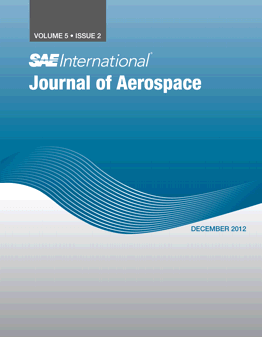
SAE International Journal of Aerospace
Advancing Research in Aerospace Engineering.The SAE International Journal of Aerospace, published by SAE International, serves as a critical platform for innovative research and advancements within the field of aerospace engineering. With an ISSN of 1946-3855 and an E-ISSN of 1946-3901, this esteemed journal contributes significantly to the body of knowledge in the aerospace sector, boasting a convergence span from 2008 to 2024. While currently categorized in Q4 of Aerospace Engineering, the journal is dedicated to fostering emerging ideas, technologies, and methodologies that could eventually elevate its standing. Although it does not offer open access options, the journal ensures wide dissemination of its well-curated articles to aid researchers, professionals, and students in staying abreast of the latest developments and trends. Given its distinct focus and commitment to the aerospace community, the SAE International Journal of Aerospace plays an essential role in bridging theory and practice, making it a valuable resource for those within this vital and evolving field.

Journal of the Korean Society for Aeronautical and Space Sciences
Advancing Global Collaboration in AeronauticsThe Journal of the Korean Society for Aeronautical and Space Sciences is a dedicated platform for the dissemination of cutting-edge research in the fields of aerospace engineering and space sciences. Published by the esteemed Korean Society for Aeronautical & Space Sciences, this journal aims to bring together innovative findings and technological advancements from around the globe, thereby contributing to the ongoing development of the aerospace sector. Operating from South Korea, the journal holds an ISSN of 1225-1348 and an E-ISSN of 2287-6871, catering to both print and digital scholarly communication. Although categorized in Q4 within the Aerospace Engineering segment and ranked 139 out of 153 on Scopus, the journal plays a crucial role in fostering research collaboration and knowledge exchange among professionals, researchers, and students alike. With converged years from 2019 to 2024, it continuously seeks to enhance its contributions to the academic community through rigorous peer review and publication of original research. Given the evolution of aerospace technologies, this journal is vital for anyone involved in aeronautical research, ensuring that their work reaches the right audience.